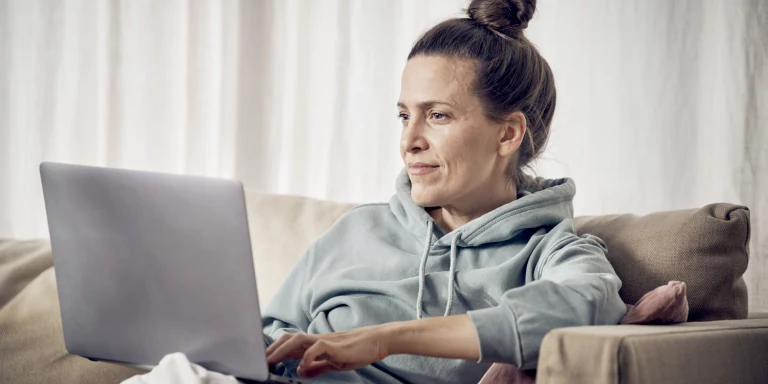
How does screen time affect our health?
Most of us can no longer imagine a life without a smartphone. And we can spend hours in front of a screen without even realising. But how much screen time is actually safe? And what can we do to avoid exceeding this time?
Screen time: how much time do we spend in front of a screen?
Whether at work or home: screens – from tablets, computers to mobile phones – have become an integral part of our daily lives. We now read the news online, connect with friends and loved ones through social media and apps, and stream movies online – all of which involves looking at a screen. At present, teenagers spend an average of 3 hours and 47 minutes on their phones every day. This doesn’t include any additional time spent in front of a TV or computer.
How does all that screen time affect our health?
One of the more common effects of spending long hours in front of a screen every day is having tired eyes and tense shoulders by the end of the day. But the consequences of excessive screen time can also be a lot more serious than that.
Physical effects
Chatting or working on a device always involves either sitting in front of a computer, or sitting or lying on the bed or sofa – all of which involves very little physical activity. A lack of physical activity can lead to tension in the body, circulation and back problems.
- The correlation between screen time and body weight has been extensively investigated and it is now considered established fact that spending too much time in front of a screen is associated with weight gain.
- Screen usage is also associated with head, neck and back pain – with the eyes undoubtedly suffering the most.
Mental health effects
In addition to affecting our bodies, too much time spent in front of a screen can also have a detrimental effect on our mental health. Young people and children’s mental health in particular seems to suffer when digital device usage becomes a regular feature.
- One of the reasons for this is that the high levels of blue light emitted by electronic devices keep us awake at night and can lead to sleep problems over time.
- One of the first symptoms of a lack of sleep is irritability.
- There have also been several studies that have shown a link between hyperactivity and excessive media consumption.
- Too much screen time can also lead to short attention spans and having difficulty concentrating. There has been a marked increase in short attention spans and hyperactivity since the start of the pandemic.
- In extreme cases, excessive screen time can also lead to internet addiction.
How does digital device usage affect our eyes?
What is computer vision syndrome?
Humans blink about 10 to 15 times a minute and, every time the eyelid comes down, it moistens the surface of the eye with tear fluid. This process is very important for the health of our eyes. This is because tear fluid contains antimicrobial substances and hence protects the cornea from infection. However, when we are staring intently at a screen, we often forget to blink. This lack of blinking is what gives rise to computer vision syndrome, the effects of which are:
- Red eyes
- Sensation of a foreign body in the eye
- Burning eyes
- Flickering vision
- Tired eyes
- Watering eyes
How do you prevent computer vision syndrome?
- Take breaks: take a break from looking at your screen and relax your eye muscles as often as possible. When doing so, allow your gaze to wander through the room and focus on objects in the distance.
- Ergonomics: keep at a minimum distance of 50 to 80 centimetres from your screen.
- Air quality: make sure that your room is well ventilated and, if possible, avoid having the heating or air conditioning on.
- Moisten your eyes: if your eyes are dry, moisten them with eye drops. Make sure that the drops are free from preservatives and phosphates, because they can also irritate eyes.
- Lighting: make sure that your workplace is lit by both a desk lamp and ceiling lamp, as well as other light sources that emit different colour temperatures (conventional light bulbs, fluorescent tubes or halogen lamps).
Hazards of excessive blue light
As well as staring at a screen, the blue light emitted by phones, TVs, tablets and computers is also very detrimental to our eyes’ health. Research has shown that large amounts of blue light entering the cornea unhindered can lead to the macula becoming inflamed (macular oedema). This can cause macular degeneration, which, in turn, will cause irreversible damage to the most important part of the retina and permanent loss of sharp vision.
Tips for protecting your eyes from excessive blue light:
- Many devices have integrated blue light filters. They can be activated in the settings under “Night Shift” or “Night Mode”, after which monitors will switch to displaying a warm range of colours.
- Choose a TV with a blue light filter – there are a wide range of them available now.
- In the dark, our pupils open very wide, which allows a lot of blue light to enter the eye. Hence, always switch on another light source in your room in the evening when watching TV.
- Always use yellow/orange tinged bulbs in your LED lights, because they will filter out nearly all of the blue light elements emitted by the bulb.
It is particularly important to make sure that children do not spend too much time in front of a screen. The light emitted by screens actually stimulates eye development, which causes eyes to become longer. This can also lead to short-sightedness. However, excessive screen time also leads to less physical activity, which is very important for children’s development. For this reason, the WHO recommends that children under the age of two should not spend any time whatsoever in front of screens. From the age of two to four, the maximum recommended time is one hour. The EU European Safe Online Initiative has set out the following guidelines:
- 0 to 3 years: maximum of 5 minutes
- 4 to 6 years: maximum of 20 minutes (but not daily)
- 7 to 10 years: maximum of 30 to 45 minutes daily
Other things parents can do
- Set out clear times and rules for electronic device use – that eliminates the need for repeated negotiation
- Model the behaviour you expect from your children. Make sure you also take breaks from using your phone
- Provide your child with alternative choices
- Don’t just keep an eye on screen time, but also on media content
- Switch off phones and tablets two hours before bedtime
How can you limit your screen time?
- Most smartphones have various options for reducing your screen time. One of these is to set “Downtimes” during which you can only be reached by selected contacts. Another is to enter time limits for specific apps. In that case, you will be notified once you have reached the usage limit you selected for that app. The app will then automatically be blocked unless you extend the time limit. This option can have a really positive impact even if you don’t end up keeping to your limits, because it will give you a better sense of how much time you are spending on these apps.
- Switch off as many of your notification alerts as possible. They are a constant distraction and tend to make us reach for our phones even more often.
- Ban electronic devices from your bedroom. There is a tendency for people to endlessly scroll through the net, in particular in the evenings, which often prevents us from realising how tired we actually are.
- Do not use your phone as an alarm at home, otherwise, the first thing you will be reaching for in the morning will be your phone.
- Do a digital detox from time to time. Give yourself a break and unplug from all digital media for a while. This could be an hour, a day or an entire month – whatever your circumstances permit (work, family, etc.) and depending on your personal goals. It might take a bit of effort at first to stop yourself from picking up your phone. However, it won’t take long before you will start being surprised about all the extra time you’ve suddenly got – and start loving it.

The expert provided the editorial team with advice and input for this article. Julia Pieh (doctorate in pharmacy and toxicology, pharmacist, naturopath) works in the Helsana Health Consultation Service.

Newsletter
Find out more about current health issues every month and get all the information you need about our attractive offers from all Helsana Group companies * delivered by e-mail to read whenever it suits you. Our newsletter is free of charge and you can sign up here:
We did not receive your information. Please try again later.
* The Helsana Group comprises Helsana Insurance Company Ltd, Helsana Supplementary Insurances Ltd and Helsana Accidents Ltd.